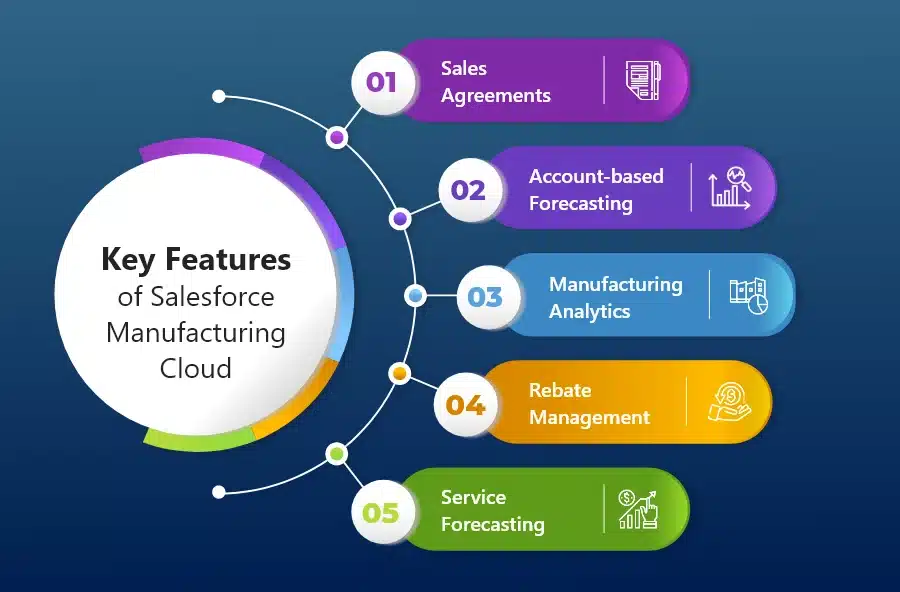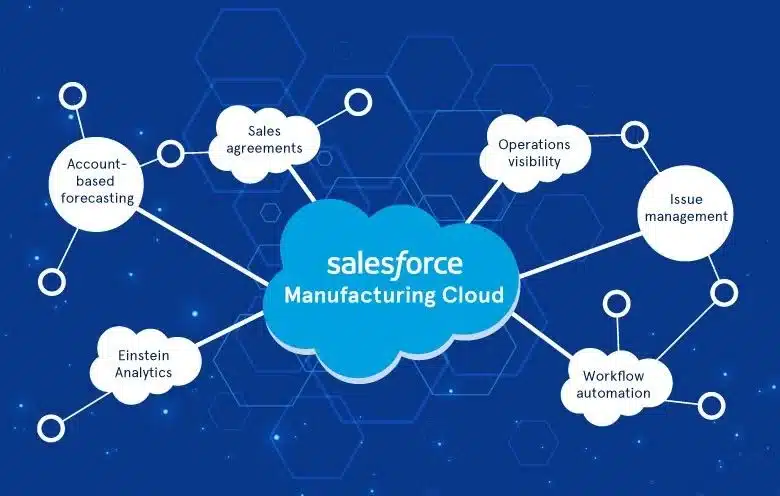The efficiency of a company’s supply chain determines whether it can prosper or fail in a time of global concerns and technological breakthroughs. At this juncture, the introduction of Salesforce Manufacturing Cloud radically changes how manufacturers handle their supply networks’ intricacies.
This blog post will detail Salesforce Manufacturing Cloud, including its features, operation, and why supply chain efficiency calls for it.
Understanding Salesforce Manufacturing Cloud
Salesforce Manufacturing Cloud is a renowned and trusted platform that has been meticulously designed to satisfy the unique needs of manufacturers. Thanks to its extensive feature set, manufacturers benefit from intelligent insights, seamless collaboration throughout their supply chain, and real-time visibility. This solid base allows producers to remain competitive in ever-evolving manufacturing markets.
Key Features of Salesforce Manufacturing Cloud

Salesforce’s Manufacturing Cloud caters to the demands of manufacturers by providing a wide range of functionalities. Let’s examine a couple of salesforce manufacturing cloud features in greater detail:
- Having sales agreements to monitor and oversee the terms of contracts between buyers and suppliers is crucial to maintaining a transparent supply chain.
- Accurate forecasting is crucial in the manufacturing industry, which is why account-based forecasting has gained popularity in recent years. The Salesforce Manufacturing Cloud gives businesses access to trustworthy information by letting them fine-tune the prediction algorithm and factor in various variables.
- The Community Cloud is an online meeting place where companies and their clients or affiliates can freely exchange ideas and information.
- With the support of Einstein Analytics, manufacturers can use Einstein Analytics to make better decisions about sales pacts, product efficiency, and pricing.
- Benefiting from seamless connection with existing Enterprise Resource Planning (ERP) and Order Management Systems (OMS) systems is a significant strength. This link allows the Manufacturing Cloud to function as a centralized system through several methods, such as Application Programming Interfaces and the MuleSoft Accelerator for Manufacturing.
Applicable Industries for Salesforce Manufacturing Cloud
Salesforce Manufacturing Cloud is not industry-specific; it covers many sectors.
- Automotive
- Aerospace
- Food and Beverage
- Healthcare
- Industrial Equipment
- Original Equipment Manufacturers (OEMs)
- Production Suppliers
- Distribution or Aftermarket Manufacturers
- Process Manufacturers
- Oil and Gas Producers
Benefits of Salesforce Manufacturing Cloud
Your manufacturing company will gain a lot from implementing Salesforce Manufacturing Cloud, including:
Transform Business Practices
Salesforce Manufacturing Cloud revolutionizes your commercial operations by providing the necessary competitive edge through real-time visibility and intelligent analytics.
Mastery of Revenue Development and Prediction
Having total control over your top-line revenue growth and estimates is crucial. You can base judgments on facts when you have the power of the Manufacturing Cloud.
Improved Customer Service
Today’s customers anticipate efficient and accessible service encounters. You can ensure exceptional customer service by using Manufacturing Cloud to integrate customer interactions into a reliable source of truth.
Fortify Relationships with Partners
Success requires effective partner collaboration. Increased efficiency in these interactions leads to better coordination and fewer disruptions in the supply chain, thanks to Salesforce supply chain.
Useful Analytics to Make Well-Informed Decisions
Manufacturing Cloud provides the analytics you need to make decisions more quickly and wisely. In a fast-paced production scenario, this is a significant game changer.
Consolidated Manufacturing Data View
A coherent view of your manufacturing data is frequently essential to productivity. With a single center, this Salesforce Manufacturing Cloud helps you identify and eliminate inefficiencies.
Automation of Tasks
Routine and repetitive tasks can deplete resources. By automating these tasks, Manufacturing Cloud frees your employees to work on more strategically significant initiatives.
Simplified Procedures
Streamlining production processes is necessary to meet consumer demand and improve operational efficiency. Manufacturing Cloud simplifies your product’s time to market by automating approvals and standardizing operations.
Observation of Operations in Real Time
Real-time visibility is crucial for monitoring production progress, identifying issues, and taking prompt action to resolve them. You can get this kind of visibility using Salesforce Manufacturing Cloud.
How Salesforce Manufacturing Cloud Works
Let’s examine its internal workings in your manufacturing ecosystem to better understand its impact:
Salesforce Manufacturing Cloud: Planned vs. Actual Business
- Planned Business: Usually handled through opportunities and quotes, this category includes new or one-off business transactions. It also maintains track of long-term negotiated business through contracts, sales agreements, or a mix of the two.
- Actual Business: Orders versus contracts, sales agreements, quotes, and opportunities are used to track real business transactions. These statistics offer the current insights required for well-informed decision-making.
Shifting from a Linear to a Digital Supply Chain
Conventional supply chains frequently function linearly, with distinct data and systems at each level. These systems need integrations to increase data visibility. On the other hand, a digital supply chain functions as a network where high-level strategic choices are made, issues can be handled instantly, and data is connected. A single digital supply chain overview compiles and displays data from multiple sources, including price, shipping, inventory, tracking, etc.
Collaboration for Enhanced Decision-Making
Collaboration can happen naturally when data is exposed to the manufacturing, procurement, production, and sales teams. Supply chain managers have the expertise they need to make choices more quickly, enhance the quality of their products, and effectively handle problems thanks to this visibility.
Three Benefits of Salesforce Manufacturing Cloud
Although putting Salesforce Manufacturing Cloud into practice may seem like a big job, the advantages significantly outweigh the drawbacks.
1. Align Customer, Employee, and Partner Experiences on One Platform
Consumers expect quick and efficient assistance. Fast responses and automated service procedures can greatly increase client satisfaction.
Real-time order status updates can improve partner relationships by improving demand planning and minimizing supply chain interruptions.
2. Digitize Your Sales Process to Boost Revenue
You may improve sales possibilities and optimize your sales process by centrally storing sales agreements, order histories, and account-based forecasts.
Your sales staff can take advantage of sales opportunities and promptly notify customers using real-time stock availability.
3. Improve Supplier and Partner Relationships
Partners and suppliers frequently use diverse data sources. Shared access to orders, cases, sales contracts, and forecasts promotes teamwork and increases Revenue.
Salesforce makes it possible to build an ecosystem of partners in which partners and sales teams work productively to improve business operations.
The Impact of Salesforce Manufacturing Cloud
Here’s a closer look at the lasting impact Salesforce Manufacturing Cloud has on the manufacturing industry:
Enhanced Visibility
Visibility is an essential component of the supply chain. With real-time visibility into your operations thanks to Salesforce Manufacturing Cloud, you can track production status, spot problems, and take prompt corrective action. With this degree of visibility, you can keep your operations running smoothly and stay ahead of possible disruptions.
Streamlined Collaboration
The foundation of effective supply chain management is cooperation. When data is accessible to the manufacturing, procurement, production, and sales teams via the Manufacturing Cloud, collaboration occurs organically. This efficient teamwork ensures that every team operates harmoniously, leading to better coordination, shorter wait times, and fewer mistakes.
Demand Forecasting
Meeting client expectations and optimizing sales possibilities depend on accurate demand forecasting. With the ability to predict and satisfy client demand, your company can increase revenue and improve customer happiness.
Quality Control
Quality control is unavoidable in production to avoid expensive recalls and warranty claims. Businesses may monitor and regulate product quality throughout manufacturing by utilizing Manufacturing Cloud’s quality control services.
Centralized Data
The Manufacturing Cloud offers a consolidated platform that creates a single view of all manufacturing data. Manufacturers may improve operational performance by locating and removing inefficiencies throughout the supply chain using this centralized data repository.
Who Can Benefit from Salesforce Manufacturing Cloud
Instead of being a one-size-fits-all solution, this cloud-based Platform adjusts to meet the needs of different industrial entities, each with its own set of issues and requirements.
- Original Equipment Manufacturers (OEMs): Salesforce Manufacturing Cloud provides the resources required to streamline the supply chain for companies producing OEM goods, such as consumer electronics, industrial machinery, or specialty components.
- Production Suppliers: Suppliers are vital to the manufacturing ecosystem because they give OEMs and other manufacturers the necessary materials, components, and parts. Manufacturing Cloud facilitates cost-effective operations and improved partnerships by helping production suppliers manage their inventories, expedite the procurement process, and improve partner communication.
- Distribution and Aftermarket Manufacturers: Salesforce Manufacturing Cloud is ideal for manufacturers distributing goods or offering aftermarket services to streamline sales procedures, increase productivity, and fortify bonds with partners and clients.
- Process Manufacturers: The supply chain has particular difficulties in the process manufacturing sector, which comprises the chemical, pharmaceutical, and food production industries. Salesforce Manufacturing Cloud provides real-time visibility into operations, extensive quality control tools, and cost optimization capabilities to accommodate the complex nature of these processes.
- Oil and Gas Producers: With its help, oil and gas companies can enhance their operational performance by encouraging cooperation, keeping a centralized view of manufacturing data, and streamlining their intricate supply chains.
Read- The Benefits of Industry-Specific Solutions with Salesforce Vlocity
Salesforce Manufacturing Cloud: Conclusion
It’s your time now to investigate Salesforce Manufacturing Cloud’s disruptive potential. Regardless of your industry or size, if you run a manufacturing company, you should think about how this Platform can transform every aspect of your business, from order fulfillment to production scheduling. Move to improve partner connections, increase supply chain efficiency, and streamline revenue operations. At advansappz, we ensure all your technology-related questions are answered, and you get the best cloud solutions for elevating the growth of your business.
Frequently Asked Questions
Salesforce Manufacturing Cloud is a specialized customer relationship management (CRM) solution designed for the manufacturing industry. It helps manufacturers manage their operations, improve collaboration, and gain insights into their production and supply chain processes.
Manufacturing Cloud provides manufacturers with tools to forecast demand, optimize their production schedule, track product quality, and collaborate more effectively with partners and customers. It can lead to improved efficiency, reduced costs, and increased customer satisfaction.
Key features of Manufacturing Cloud include:
- Demand Forecasting: Predict customer demand more accurately.
- Sales Agreements: Manage customer commitments and order volumes.
- Account-Based Forecasting: Forecast and track demand for specific customers.
- Collaborative Planning: Collaborate with partners and suppliers.
- Quality Management: Monitor and manage product quality and defects.
The appropriate rate for an IT consultant can vary widely based on factors like experience, expertise, location, and the services you offer. Research rates in your area and consider your skills when determining your hourly or project-based rate.














